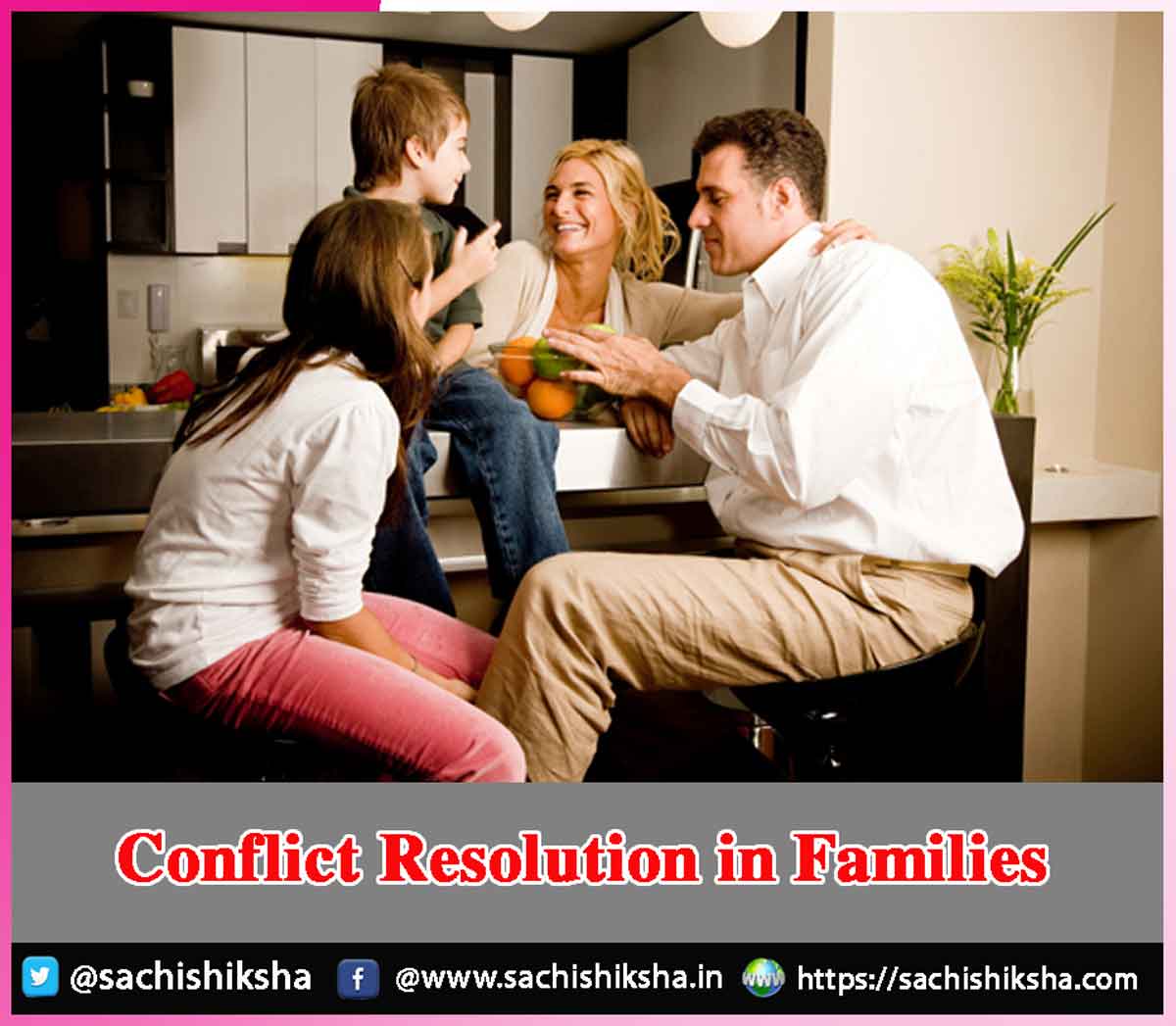Conflict Resolution in Families
Introduction: All humans are unique. Their thinking processes, cultures, values and beliefs are different, which may often clash with others, leading to conflicts of ideas. The more the number of people or diversity, the higher the chances of difference in opinions. While these differences may arise in any field of life, such as workplace, or among friends, the one that affects people the most is the one within the family.

Table of Contents
Traits and Means for Conflict Resolution
Looking at how to resolve conflict in families, the basics of being calm and listening to the other party play a vital role. Along with these, the picture below shows the important traits and means for conflict resolution:
Being Calm and Listening to the Other Party:
Most of the conflicts arise due to unnecessary anger and can be resolved with a calm mind, which will allow the person to think rationally. Listening to understand instead of listening to respond is another thing that must be consciously applied, so that we understand the other person instead of blaming them.
Teamwork:
Like the quote says, “It’s you and me vs the problem, not you vs me”. The members of the family need to sit together as a team and work towards resolving the problem. In this process, the core is to identify the issue and then work towards solving it together. This may involve open-heart conversations and brainstorming sessions.
Creating Safe Space:
The home should be a safe place for the discussions to happen. Ensuring that everyone feels safe to express his/her thoughts and feelings without fear of judgment or retaliation is essential. Certain ground rules, such as no usage of foul language may also be established. A supportive environment fosters more open and honest communication.
Open Communication:
In all human relationships, communication is the key. As long as people express their feelings and opinions in the right way, all misunderstandings can be resolved. Again, the way of communication is of utmost importance. A wiseman once quoted,
“10% of conflicts are due to difference of opinion. 90% is due to the wrong tone of voice”. Keeping this in mind, the right words and soft tone may be used for friendly resolutions.
Empathy:
Humans sometimes tend to be selfish and think only from one perspective, their own perspective. Empathy teaches us to put ourselves in the opposite person’s shoes and think from their perspective. This way of thinking will offer a wider and deeper perspective to us and help us reach the depths of the real problem. Family members will be in a better position to offer the right solutions once they know how it feels on the other side of the road.
Negotiations:
Rushing to a conclusion without thinking and talking about it, will only cause more misunderstandings. Keeping in mind that solving the issue is more important than winning the argument and having discussions over at the dinner table, will bring up the possible solutions to the issues at hand. Involving the elders in the house, who bring in their experiences of raising a happy family, may in certain situations also help in the negotiation processes.
Agree to Disagree:
Especially during conflicts relating to personal values or beliefs, agreeing to disagree goes a long way. Sometimes, we just must acknowledge and accept the views of the other party. Acknowledgment is the first step towards maintaining respect and harmony. Trying to force one’s view on others may not work, instead, acceptance and negotiations may help in continuing a fulfilling relationship.
Positive Behaviour:
Thinking positively will help foster more constructive and supportive interactions among the family members. When the family members are positive, the environment becomes nurturing and conducive to problem solving and friendliness.
Setting Time-outs:
Sometimes the discussions may get prolongated and heated up, which is exactly when a timeout needs to be taken by the family. A small walking break may be taken, or the discussion may be continued on the next day with a fresh and calm state of mind.
Incorporating Humour:
A little humour can defuse tension and make discussions more amiable. Ensure that humour is used appropriately and doesn’t minimize the seriousness of the issue nor hurt anyone’s feelings.
Practice Scenarios:
Role-play of different conflict scenarios will help in handling disagreements in a constructive manner.
Following Up:
Once a conclusion is arrived at by the family members, following up with the members is important to see if the solution which is arrived at is working or not. It is also important to address any residual feelings or new issues that may have arisen. Checking in with the members of the family, will inculcate the feeling of togetherness and understanding.
Professional Advice:

Avoid Conflicts:
With all these steps in mind and being responsible people, the conflicts in the family may find a way of friendly resolution. On the other hand, avoiding conflicts is also essential to lead a peaceful life. Simple practices like spending quality time with the family, having honest conversations, forgiving each other and working together for the betterment of the family and fulfilment of the dreams will help in leading a happy family life.
Conclusion
It has been wisely said, “Family is not an important thing, it is Everything.” Everyone in the family from the elders to the children must always remember that family is the core of happiness. Therefore, all the family members should act with love and affection towards the achievement of a common goal.













































